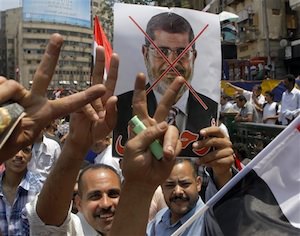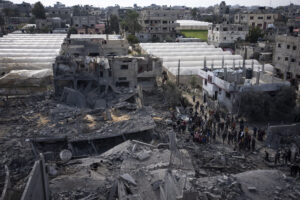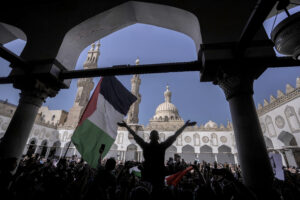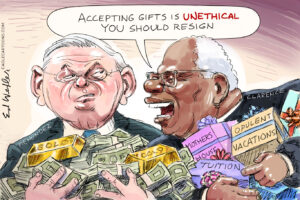Biggest Demonstrations in Egyptian History: Millions Demand Morsi Step Down
The Egyptian military estimated that "millions" of Egyptian demonstrated on Sunday to demand early presidential elections, only one year into the four-year term of President Mohamed Morsi of the Muslim Brotherhood. The nationwide rallies were, the military said, the largest in Egyptian history.
This piece first appeared on Juan Cole’s website, Informed Comment.
The Egyptian military estimated that “millions” of Egyptian demonstrated on Sunday to demand early presidential elections, only one year into the four-year term of President Muhammad Morsi of the Muslim Brotherhood. The nationwide rallies were, the military said, the largest in Egyptian history.
The army estimated that 500,000 gathered at Maydan al-Tahrir in Cairo, and 100,000 in downtown Alexandria, demanding that Morsi “depart!”
The streets leading into Tahrir were so packed that late arrivers could not reach the Square. Tens of thousands of protesters marched from the Square to the Ittihadiya presidential palace, chanting “The people want the fall of the regime” and chanting against the Muslim Brotherhood from which the president hails, calling for the fall of the rule of the Supreme Guide (Muhammad Badi` is the head of the Brotherhood, and they were accusing Morsi of being his puppet). A slide show of images is here.
Demonstrations were also held in provincial towns and cities all over the country, including Alexandria, Minufiya, Kafr Sheikh, Asyut, Ismailia, Port Said, and many others. For the most part, Sunday’s rallies were peaceful, amazingly so given the millions involved. But there were a few exceptions, and at least 5 people died in violence. In Port Said a bomb appears to have gone off, killing a journalist and wounding dozens, but it did not deter a massive crowd from gathering at Martyrs Square. In Asyut a clash occurred between pro- and anti-Mursi crowds that left 4 dead and dozens wounded. Activists in Ismailia on Twitter declared the city a Muslim Brotherhood free zone. Muslim Brotherhood centers were attacked or burned in some provincial towns. In the Muqattam Hills above Cairo, thugs set fire to the HQ of the Freedom and Justice Party of the Muslim Brotherhood. The activists had not called for protests in Muqattam, so this criminal act issued from other quarters, very possibly from Mubarak supporters still sore about the supplanting of his party by the Brotherhood.
Much of the protest is economic. Morsi’s government has pursued austerity policies and it has failed to revive tourism or attract substantial productive investment. Egypt’s foreign currency reserves have been cut in half, causing the Egyptian pound to fall in value, and hurting Egyptians, who depend on imported food and fuel. The textile workers of al-Mahalla al-Kubra, whose 2006-2008 strikes were a rallying cry for anti-Mubarak activists, have warned that under Morsi their factories are threatened with closure altogether. Although some of the animus against Morsi comes from liberals and secularists annoyed by his religious fundamentalism, many of the protesters on Sunday were devout Muslims who just object to Morsi’s high-handed style of governing, failed economic policies, and favoritism toward his Muslim Brotherhood base. One banner in Tahrir said, ‘we are for Islam, against the Muslim Brotherhood.’
The army estimated that 20,000 supporters demonstrated for Morsi in the square in front of the Rabi’a al-`Adawiya Mosque in Nasr City, about 5 km from the Ittihadiya Presidential Palace. (The ministry of interior spokesman, a Muslim Brotherhood supporter, gave out completely fantastic estimates of 17 million in the streets throughout the country, the vast majority of them supporting the president. It claimed 4 million at Nasr City, which is quite impossible. As far as I can tell from various reports both in Cairo and the provinces, this allegation is ridiculous on the face of it.)
The anti-Morsi demonstrations were called for by the Rebellion or Tamarrud movement, founded on April 28 and launched on May Day by youth disillusioned with Morsi, some of whom had voted for him, including Mahmoud Badr. Some of the Rebellion activists came out of the youth wing (Youth for Change) of the Kefaya (Enough!) movement founded to protest the dictatorship of Hosni Mubarak in 2004.
The Rebellion Movement deployed two protest tactics. One was the gathering of signatures on a petition asking Morsi to step down. I was in Egypt in early June and found these petitions were everywhere, and I was handed them more than once myself. Rebellion sought to gather 15 million signatures, since Morsi had won the presidency last year with about 13 million votes to 12 million votes for his rival, Ahmad Shafiq. They figured 15 million signatures against him would demonstrate that he had lost his popular mandate. In the event, Badr says that Rebellion was able to gather 22 million signatures to its petition asking for early presidential elections. (Morsi was elected to a 4-year term in June, 2012 but Rebellion wants him to step down and to hold new elections immediately).
The second tactic was to call for massive rallies and sit-ins beginning June 30, the anniversary of Morsi’s election, which they envisage continuing until Morsi meets their demand. That is,the millions in the street on Sunday were not gathered, as some Muslim Brotherhood officials alleged, for “just one day.” Rebellion gave Morsi until Tuesday to step down, and if he doesn’t, they plan further huge rallies, including on Tuesday and then Friday.
There is no provision in either the 1971 or the 2012 Egyptian constitution for the president to be recalled, so the demands of the youth are technically unconstitutional. But from their point of view, Morsi’s behavior last fall, in putting himself above the law and pushing through a controversial constitution with some fundamentalist implications, were crimes of a Nixonian sort, and so they are demanding he resign rather as Americans demanded that Tricky Dick resign,in 1975. In contrast to Nixon, however, Morsi’s support has not collapsed and he isn’t in danger of being impeached (there is no elected parliament at the moment). The only part of the elite that could force him out of office is the army, and a military coup could not possibly be good for Egyptian democracy. Ironically, from February 2011 through August of 2012, the main demand of the activist youth was that the army return to its barracks. To be fair, the youth are not demanding army intervention, they are demanding a kind of California-style recall of the executive and early elections.
Your support matters…
Independent journalism is under threat and overshadowed by heavily funded mainstream media.
You can help level the playing field. Become a member.
Your tax-deductible contribution keeps us digging beneath the headlines to give you thought-provoking, investigative reporting and analysis that unearths what's really happening- without compromise.
Give today to support our courageous, independent journalists.






You need to be a supporter to comment.
There are currently no responses to this article.
Be the first to respond.